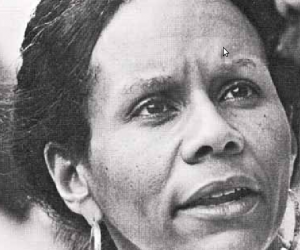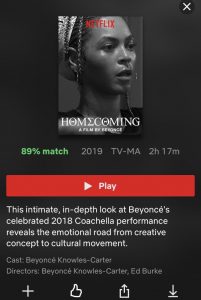
I think often about the sustainability of Black women’s creative work. I also think about the what it would take in order for Black women to be properly cited and compensated for their work. To this end, I only just recently watched Beyoncé’s Homecoming because I knew that I wanted to write about Black women, compensation and audience desire for this space. The film has been on my radar and I have talked to people about Homecoming, but I had not sat down and attentively watched it until last week. [Read more…] about Beyoncé Knowles Carter, Rihanna Fenty and the Sustainability of Black Women’s Creative Work
Archives for June 2019
June Jordan on the Future
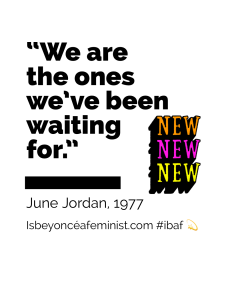
Medium Tings, The Colored Girls Museum and ARThouse: Black Women’s Art Institutions
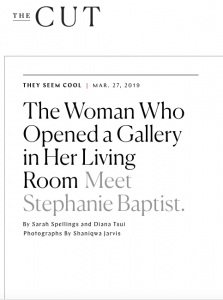
One of the best parts of creating this online museum-blog has been learning about the various artistic institutions that Black women have created across the country.
I had known about Medium Tings, a Brooklyn based art gallery, from social media.
Dr. Ruth Nicole Brown (of SolHOT) told me about Philadelphia based Colored Girls Museum last February when I told her about conceptualizing #IBAF as a online museum space.
I learned about Vanessa German’s work from conducting research on Black women visual artists. It was only through looking at her work online and reading about her on Culture Type that I learned about ARThouse and the Love Porch.
Black women have often used a variety of means and materials to make art in the best way that they know to be possible. I am drawn to these projects because they are community facing, accessible in a way that art housed within larger institutions often is not, and they are created by Black women.
It gives me hope.
Are there any other institutions that I should be aware of?
Black Women Who Run from Their Genius (May) Make Themselves Sick. ~Kathleen Collins [Repost]
Kathleen Collins on the set of her film Losing Ground
(Originally written in 2012, and posted on newmodelminority.com)
I have been obsessed and fascinated with Kathleen Collins for the last year. She is a Black woman filmmaker, a film professor, a momma, she attended Skidmore and the Sorbonne. She died in 1988 of cancer at 46.
First I learned about her from Jaqueline Bobo’s Black Women Film and Video Artists, and then I saw her film Losing Ground (1982) and lastly I just read an article about her by Black film scholar, L.H. Stallings.
Collins says several things in her Black Film Review Interview that you can read here, but I just want to summarize the parts that have been meaningful to me.
BLACK WOMEN WHO RUN FROM THEIR GENIUS MAY MAKE THEMSELVES SICK
My basic premise is ithat all illness is a psychic connection of some kind.. And I had a period of time when I was ill. I still have to struggle with it. The nature of illness and female success and the capacity of the female to acknowledge its own intelligence is a subject that interests me a lot . because I think that women– if there’s anyway that I am a feminist, because I don’t really think of myself as a feminist, because I don’t really think of myself as a feminist– but if there is any way in which women tend to be self destructive it is in that area of creativity where they actually feel their own power and can’t acknowledge it or go into it with as much…
They can’t go to the end of it and they retreat into illness or into having too many babies or into destructive love affairs with men who run them ragged. Somewhere or other, they detour out of a respect for their own creativity.
Let me say first off that I do not agree that all illness that Black women experience is a result of a psychic disconnection. However, I do think there is something to be said about what happens to our bodies when we ignore the genius in our hearts and our minds when it pertains to making art.
I read this a year ago. However it was reading it last month that I was floored by not only this idea but the following statement, which has to do with the fact that she felt like her own illness was connected to a fear of her own genius.
WHEN DID COLLINS BECOME ILL?
I think that it is very curious, curiously at a point and time when I had just finished a first movie, and knew that I had it, knew that I had the talent. Knew that my own creative power was finally surfacing, that all the years of working quietly , and quite alone, were beginning to pay off. It was basically a long four year cycle.
Collins died in 1988 at 46 years old of cancer. It is interesting that she felt like she became ill right when she felt the power of her own creativity.
ON BEING AFRAID OF BEING ALONE AS AN ARTIST
I think I have been afraid of being alone too much, I think that’s what was connected to the illness. That fear that I was going to be considered nuts kind of frightened me.
This really resonated with me, not because of the fear of being seen as being eccentric; it is the fear that in order to take it to the next level I am going to have to be separated from the people that I Love. I now realize that in order to grow the voltron, I have to branch out into new spaces. I also have to have faith that my Love bears will be there when I return; that they will understand. I have also come to the conclusion this weekend, that I need to be able to be out, but I also need consistent environments so that I can hear my own ideas. Too much noise drowns out the thoughts.
ON THE INTERIOR LIVES OF BLACK WOMEN AND BLACK PEOPLE
There are real conflicts, but they are not necessarily conflicts with a capital C. All internal conflict is the only thing that is really real. Where you’re right is in saying that American culture tends to like conflict with a capital c.
This spoke to me for three reasons. One I have known that taking care of my interior life would be key to my survival for a few years now, and this crystallized for me, after re-reading Their Eyes Were Watching God. Two, Junot Diaz has been speaking in his interviews about writing the interior lives of women while on tour promoting his new book. Third, one of the reasons why I chose qualitative interviews as my method is because I am interested in the interior lives of Black women.
In Kathleen Collins I see myself and I am trying not to run.
Thinking About Audre Lorde and the Violence of the Self Care Industrial Complex
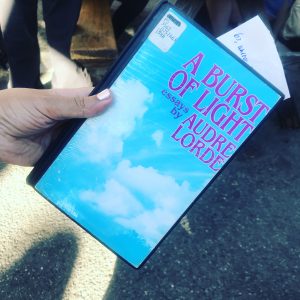
The self care industry is worth nearly eleven billion dollars.
This past Women’s history month I became obsessed with the fact that Audre Lorde’s quote about self care being revolutionary was seemingly ubiquitous. It was every where. I set out to find out the origins of the original quote. The original quote comes from the epilogue of the book A Burst of Light by Audre Lorde.
Lorde made that statement after she found out that she had gotten Cancer a second time. She’d be in Germany seeking alternative health treatments, teaching, holding workshops and building community with Afro German women and women of the Black diaspora in Germany and in the United States.
Lorde was not talking about some individual notion of self care, she was talking about figuring out how to stay alive in a system that was trying to kill her. I realized after I found the quote that this is issue that I had with the self care quote. Not only does it violently remove the context of her original statement but it puts the onus of care on the individual. Lorde’s entire essay, and a better part of the book is about figuring out how to be in her body, find the best treatments possible, evaluate the value of the opinions of doctors who were often hostile to her and ultimately how to make peace with having Cancer.
In light of the current conversation around medical care, access and the vulnerability of Black women’s bodies her statement and analysis continues to be relevant.
As I wrote this I began to wonder two things:
What kind of would would we have to live in order for Black women to be properly credited, cited and paid for their work?
What happens when the words of Black feminists are completely taken out of context?
